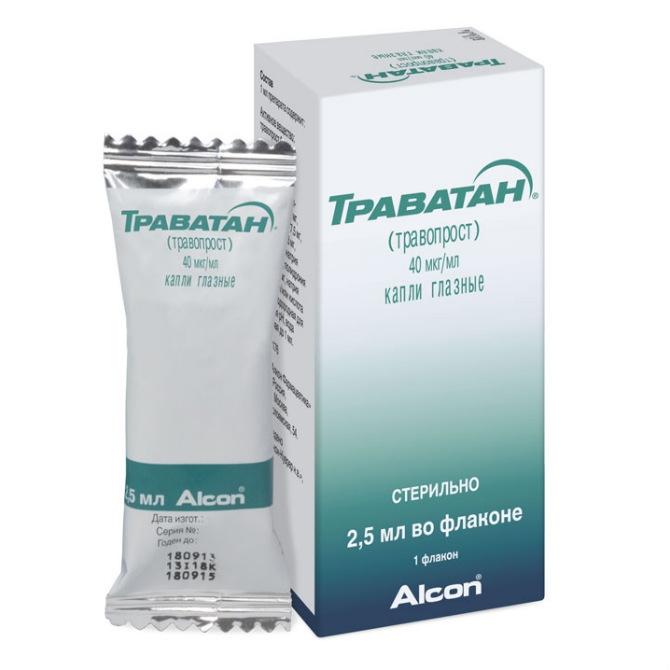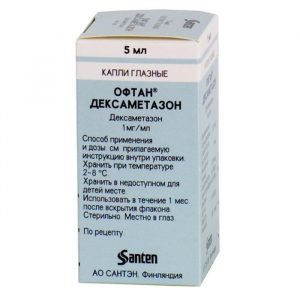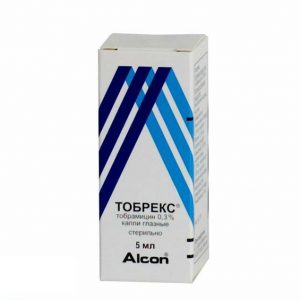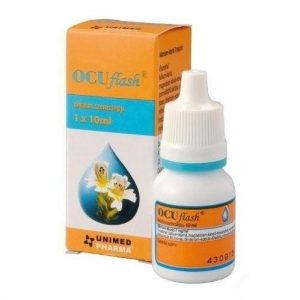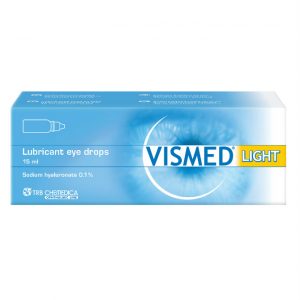Description
Latin name
Travatan
Release form
Travatan. Eye drops in the form of a clear or opalescent solution from colorless to slightly yellow in color.
Packaging
2.5 ml – plastic dropper bottle Drop Tainer (1) – bags of aluminum foil (1) – packs of cardboard.
Pharmacological action of
Anti-glaucoma drug. A synthetic analogue of prostaglandin F2 .
Is a highly selective agonist of prostaglandin FP receptors. Reduces intraocular pressure by increasing uveoscleral outflow of aqueous humor.
Intraocular pressure decreases approximately 2 hours after the use of the drug, the maximum effect is achieved after 12 hours
Pharmacokinetics
Absorption and metabolism
Travoprost is absorbed through the cornea of the eye, where hydrolysis of the herbal growth takes place to the biologically active form – grass growth acid.
Cmax of travoprost in blood plasma is achieved within 30 minutes after topical application and is 25 pg / ml or less.
Excretion
Travoprost is rapidly excreted from plasma, within an hour the concentration decreases below the detection threshold (<10 pg / ml). Travoprost is excreted as inactive metabolites mainly with bile (61%), the rest is excreted by the kidneys. Indications Decreased increased intraocular pressure in the following conditions: open-angle glaucoma increased ophthalmotonus. Contraindications children and adolescents under 18 hypersensitivity to the components of the drug. Caution should be given to patients with risk factors for macular edema (aphakia, pseudophakia, damage to the posterior lens capsule) in acute iritis, uveitis. Use during pregnancy and lactation Prescribing during pregnancy is contraindicated. There is no sufficient experience with the use of the drug during lactation. Application during breastfeeding is possible only under the supervision of a doctor and only if the expected therapeutic effect for the mother outweighs the risk of possible side effects for the baby. Dosage and administration The drug is instilled 1 drop in the conjunctival sac of the affected eye (s) 1 time / day, preferably in the evening. More frequent use of the drug may lead to a decrease in its effectiveness. Side effects From about Rgana of vision: in 35% of cases – transient mild hyperemia of the conjunctiva, passing on its own in 5-10% of cases – decreased visual acuity, a feeling of discomfort and foreign body, pain, itching, burning in the eyes in 1-4% of cases – visual disturbances, blepharitis, fog before the eyes, cataracts, conjunctivitis, dryness of the conjunctiva, discoloration of the iris, keratitis, the formation of crusts on the edges of the eyelids, photophobia, subconjunctival hemorrhages and increased lacrimation. From the cardiovascular system: in 1-5% of cases – increase or decrease in blood pressure, bradycardia, angina pectoris, chest pain, hypercholesterolemia. From the side of the central nervous system: in 1-5% of cases – general anxiety, headache, depression. From the urinary system: in 1-5% of cases – urinary incontinence and urinary tract infections. From the musculoskeletal system: in 1-5% of cases – arthritis, back pain. Other: in 1-5% of cases – flu-like syndrome, sinusitis, bronchitis, dyspepsia. Drug Interaction There is currently no interaction with other medicines. Overdose Symptoms: irritation of the mucous membrane of the eye, conjunctival hyperemia or episcleras. Treatment: carry out symptomatic therapy. Storage conditions The drug should be stored out of the reach of children at a temperature of 2 ° to 25 ° C. Expiration 3 years. After opening the vial, eye drops should be used for 4 weeks. pharmacy terms for prescription dosage form dosage form eye drops Alkon, USA p16freaf Alkon, USA p16freaf Alkon S.A., USA
